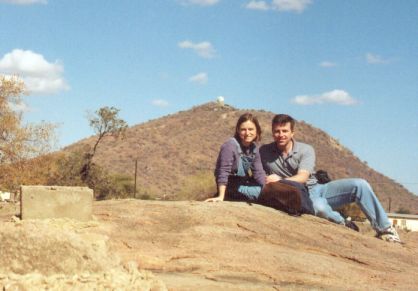Sunday, December 10, 2006
Two months in...
It has now been 8 weeks since the hospital opening. And, no surprise, we have been quite busy. For the first 3 weeks we saw only outpatients. Then we opened up the inpatient ward and the operating rooms. Inlcuding ourselves, there are 4 full-time volunteer doctors, about 30 nurses (with various levels of training and experience), and a handful of ancillary staff. During this time we have seen over 1500 outpatients, performed over 250 major and minor operations, and have admitted about 300 inpatients. Over the weeks and months to come, I’d like to tell you their story, one person at a time. All patient pictures have been taken and published with permission, all names are included with permission, or have been changed for privacy.
I met Dona Cristina, a woman of 56 years, looking tired and weak in our ‘banco de urgência’ (emergency room) a week ago. She was brought in by her very worried son, who flew in from the northern Angolan enclave of Cabinda, because of nausea, vomiting, weight loss, and failure to thrive.
Cristina was born here in Lubango. Shortly after her birth her mother left her, to be raised by her aunt and her father. At that point an only child of a very poor father, he would strap her to his back (as African women do with their children) and take her to work with him. By the age of six, she was working herself, digging and moving rocks to help pay for her own clothes and food. Her father eventually remarried and she became the oldest of a family of 10 children. It soon became clear, both from her diligence and servanthood, as well as the mantle passed down from her father, that she would be the head of this household. Hard manual labor characterized her adolescence and young adulthood, as did her simple and vibrant faith. She prayed and sang as she worked, and never missed Mass on Sundays.
At 20 she married and they soon were parents to 5 children. He became an alcoholic and left the family when she was in her 3rd trimester with the last girl. This child died 2 years later. Left to raise her children alone, not uncommon on the Continent, Cristina committed to never let her children go hungry or without education. She worked long hours to accomplish this. Her children succeeded in their pursuits: a nun serving in a Catholic order in provincial France, a nurse serving in a referral hospital in Paris, an entrepreneur in Cabinda, and a businessman here in Lubango.
In the last few years, she lost many of her brothers and sisters. Six months ago, her youngest son died. Her extended family looked to her for emotional, spiritual, and financial support. Untiring, she served and loved without complaint. Her fortitude was such that no one noticed, perhaps not even herself, that she was slowing down, loosing weight, not eating well.
Her children wrote and called often, but home was far away and difficult to get to. She acknowledged that she felt alone. She wondered if her 2 year old had not died – she’d be 21 now – if she wouldn’t be so alone. Two weeks ago, when her son called, she sounded weak for the first time. He flew down right away, and brought her to the new hospital on the hill. She has been vomiting most days, had diarrhea, intolerant to many foods. The doctor met her in the ER. When he felt her abdomen he looked concerned, pointed out findings of a very large liver to the nursing staff and pre-med students. He said her liver tests were all quite high. Finally they took her to the ultrasound room, where there was much discussion in English. There was a very large mass in her liver. As we prepared to admit her, she said to me:
“Doctor, I am very happy with the treatment plan. I am at peace. I trust that God has me in His hands, no matter what happens.”
Over the next days Dona Cristina and her family, who started flying in from around Europe and Africa, came to realize that she has a terminal disease. Though our diagnostic technologies are limited, she appears to have advanced hepatocellular carcinoma, infiltrating both lobes of her liver. The only treatment available anywhere is palliative – to give her comfort, dignity, and quality of life in her final days and weeks. She has been home now for a week. Her children are with her, her family is grieving, yet united… here is one of Angola’s heroines who has given everything for those she loves.
“Doctor …. I am at peace. I trust that God has me in His hands, no matter what happens.”
As we rush about this season straddled by Thanksgiving and Christmas, please remember Dona Cristina, her family, and the thousands upon thousand of others with their unwritten stories of suffering and loss. And also, if you will, look into those eyes with me, and see the abiding faith and sustaining grace that even still gives hope and health to this hurting world.
Robert
[Beth is currently in central Angola on an 18 day eye surgery trip. More news on that when she returns.]
Sunday, October 22, 2006
Finally in Lubango
In the time since our last entry, we arrived safely to Luanda, Angola’s capital, where we had a very productive few days. We then flew south to Lubango, where we were very warmly greeted by many of the individuals we’ll be working with over this year. This helped tremendously in our transition to our new home. The afternoon of our arrival we traveled an hour out of town via Land Cruiser up a bumpy mountain road to a place called Tundavala. It is often referred to, locally, as the Eighth Natural Wonder of the World. Here the great Central African Plateau (which spreads through several countries) drops off almost a mile down to the coastal plain below. On a clear day, you can just catch a glint of the Atlantic Ocean 100 miles away…
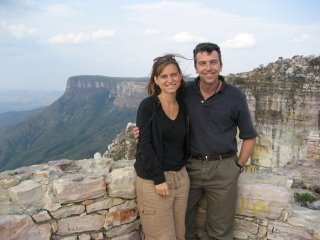 The view from Tundavala
The view from Tundavala
Lubango is a city of about 300 thousand people. Tens of thousands of these arrived during the years of the civil war, displaced from their homes by the fighting. Most of these now live in the many bairros composed of mud-brick or cement-block homes that surround the city center. The city is located at 5200 feet altitude, and surrounded on three sides by cliffs measuring an additional 900 feet. Our hospital is at the top of one of these escarpments.
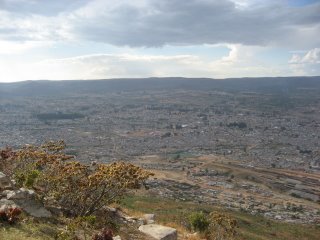 Lubango as seen from the bluffs
Lubango as seen from the bluffs
Our arrival in Lubango happened to land exactly a week before the opening of the hospital. This was not intentional on our part, but some would say the timing was providential. We spent the first week helping with arranging of the clinics and the operating rooms. We discovered all sorts of things in storage… One of our happiest moments was discovering that we had shipped a brand new polished chrome set of urethral dilators donated by Vanderbilt’s student-run equipment salvage organization, allowing us to throw out the rusty 1940s set we had been trying to salvage. I think our patients will be even happier! Plenty of stricture disease around here.
This past Monday, October 16, 2006 saw the opening of the Evangelical Medical Center of Lubango, (Centro Evangélico de Medicina do Lubango, heretofore CEML). The day started with a brief thanksgiving service and a tour to orient patients and invited guests alike. We then jumped right into clinical duties.
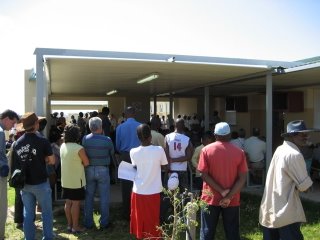
The crowd at the thanksgiving ceremony
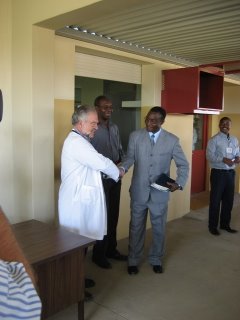
Steve (Medical Director), Daniel (Head Administrator), Pastor Moises (Chairman of the Board), and Cesar (Financial Director)
CEML currently has 4 physicians (including me and Beth), about ten nurses (half of whom have administrative roles), a handful of administrative staff, and several auxiliary staff members. We are currently running clinics only, with one day per week for procedures (cystoscopy, GI endoscopy, and laryngeal polypectomy this past week). We will open for inpatient care (40 beds currently) early in November. At that time we will also open up the general and ophthalmology operating rooms.
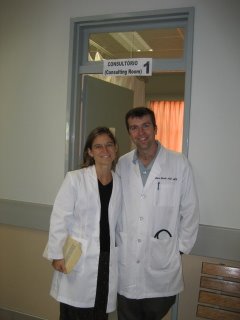 First day of patient care
First day of patient care
We are very grateful to say that the first week of the hospital has come and gone, all things considered, quite well. We saw 75 patients our first day. All of these interviews were conducted in Portuguese. By the end of the week, Beth and I were each seeing patients on our own in Portuguese (our patients are fortunately very gracious with us), or in a local language (mainly Mbundu and Nhaneca) through a translator. There are a tremendous number of challenges ahead… reliable transportation, reliable energy supply, training of nursing staff, budgetary concerns, to name a few. However at the end of the week, we have much to be thankful for, and we look forward to what is yet to come.
As many of you know, a significant portion of our funding for this year has come through a Vanderbilt Medical Scholars research grant and an educational grant through the U.S. State Department Fulbright committee. The educational encounters in this last week are almost innumerable. At our next Blog entry, we will present a few of our most interesting cases. However, to give a taste, here’s a list of some of the diseases our patients are suffering with:
Things we are used to treating:
- Uncontrolled hypertension
- Basal cell carcinoma of the face
- Fibroadenoma of the breast
- Obstructing chronic gastric ulcers
- Obstructing gastric cancer
- Giant varicose veins
- Chronic constipation
- Irritable bowel syndrome
- Anal fissures
- Fistula-in-ano
- Imperforate anus
- Benign prostatic hypertrophy
- STDs
Things we are not so used to treating:
- Malaria
- Leprosy
- Hydrocephalus
- Advanced retinoblastoma
- Giant goiters
- Obstructing laryngeal polyps
- Near-obstructing chronic tonsilitis
- Multi-drug resistant tuberculosis
- Undiagnosed abdominal masses without CT scans
- Deforming burn contracture
- Osteogenic sarcoma
- Osteomyelitis with sequestra
- Clubfeet
- Poliomyelitis
- Chronic lymphedema leading to elephantiasis
- Acute urinary retention and renal failure caused by benign prostatic hypertrophy
- Giant hydrocele
- Cystocele
- Locally recurrent cervical cancer
- Strongyloidiasis
- Amebiasis
- And the ever present “wandering snake syndrome”… best treated with a lot of bran and reassurance
For those who are the praying sort, please be praying for:
- Continued growth and deepening of our relationships with the hospital staff
- Hope and healing for our patients
- Cultural and linguistic adjustment for us
- The administrative leadership of CEML, that the hospital will be a stable institution, serving this region of Angola, including our poorest neighbors
Finally, for those who may not be aware… the rainy season has started with full force here in Southern Africa. Consequentially, Beth and I are now heading to our kitchen to stem the incoming tide of water. Until next time!
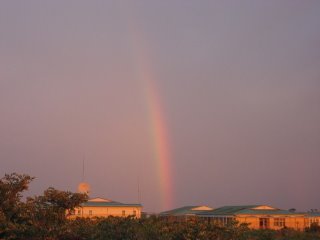
Rainbow over CEML, at the end of our day: hope and health
Monday, October 02, 2006
A little bit about Angola
Before we leave for Angola, we thought perhaps we would share some information about our home for the next many months.
Angola is a country of 11 million people located in southern Africa. It was a Portuguese colony for much of 400 years. The War for Liberation started in 1961 as much of Africa began shedding yokes of colonialism. In 1975 independence was gained in the wake of the Carnation Revolution in Portugal. Afterwards, 27-years of civil war ensued. Lasting peace accords were acheived in 2002. Four decades of war have left this beautiful country with great challenges: a ravaged infrastructure, widespread landmines, hundreds of thousands of displaced persons, and struggling access to healthcare and education. Fifty percent of the population lives outside of the reach of medical care; life expectancy is only 41 years; and one in four children dies before the age of five.
However, Angola is also now a land of great hope and promise. It has enormous natural resources in diamonds and oil. And it is now in a reconstructive phase. Efforts are being made to establish public health measures and to clear landmines. Plans are being made for Parliamentary and Presidential elections over the next couple years. And, Angola will be host to the Africa Nations Football Cup (that's soccer for the uninducted) in 2010 - the same year that South Africa will host the FIFA World Cup, the first time ever the latter is being held in Africa.
We will be living and working in the city of Lubango, in the southwestern area of the county. Rough estimates put Lubango at about a half million. We're at about a mile high. Our hospital is the newly-founded Lubango Evangelical Medical Center (CMEL). More about this once we arrive.

Thursday, September 28, 2006
Greetings from Portugal
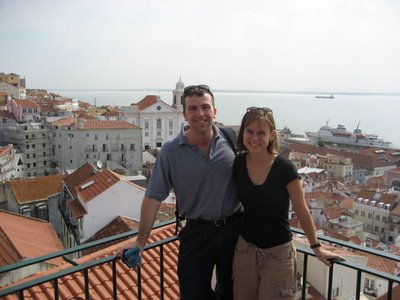
View over Alfama: old Moorish quarter of Lisbon
We have spent the last 5 weeks in Lisbon (“Lisboa”), Portugal for a crash-course in Portuguese, the lingua franca of Angola. Our language instructor, Eunice, is absolutely fantastic - language instructor, cultural interpreter, historical guide, coach, cheerleader, travel consultant, culinary counselor, and friend.
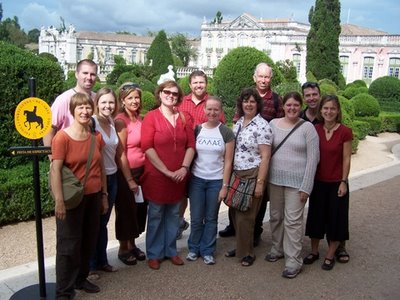
Outing to Queluz Palace with Eunice (center, sunglasses) and other language students
We live in the village of Tojal on the outskirts of Lisboa. Our day-to-day lives are pretty simple. We each have 2.5 hours of class a day, one-on-one with Eunice. We spend much of the rest of our time studying, with forays to cafes for lunch. We now have our favorite cafe waiter, pastry shop employee, juice seller, and bus driver. Views around Tojal and our home at the Instituto Biblico Português
Views around Tojal and our home at the Instituto Biblico Português
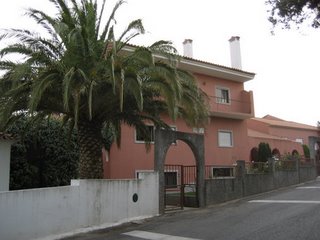
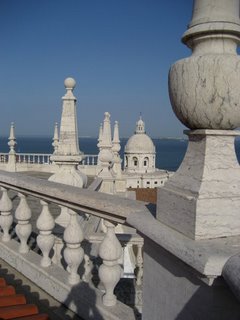 We were also very blessed to be visited by dear college friends, Rik and Alison, who now live in Amsterdam. We visited a number of historic places in Portugal - I think I caused everybody their fill of castles, palaces, cathedrals, and monasteries.
We were also very blessed to be visited by dear college friends, Rik and Alison, who now live in Amsterdam. We visited a number of historic places in Portugal - I think I caused everybody their fill of castles, palaces, cathedrals, and monasteries.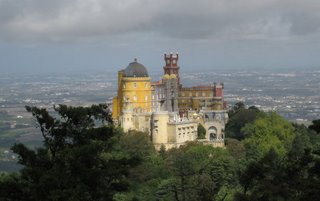
Lisbon skyline
Sintra: City of Palaces
Tomar: Last home of the Knights Templar
Next week we fly to Luanda, Angola's capital. We will be there a few days before heading to Lubango. The stories below reflect how our time has been spent in the last 5 weeks: understanding (and misunderstanding) Portuguese.
Perfecting Pastries
In learning a language, I (Beth) decided to fall back on my known strengths. Therefore, I am conquering Portuguese one pastry at a time. Most days I go to one of my two favorite cafes (there are approximately 103 cafes in the 2 blocks between our bus stop and our language class), and I ask what things are called. The patient café workers explain the items slowly in Portuguese, as onlookers giggle and nod knowingly. They say, "gjhshdgfjsdhgfjsdhgfhsjdgf?" And I say, "Yes ... I – am – learning – Portuguese." Appreciative nods, words of instruction from everyone present, much hand-waving.
Pastries and Pooping – in Portuguese
My other subject of interest is, of course, medicine. Sometimes food and medicine overlap … it turns out we can ask our patients if they had a coco (poop), or we can have a pastry called pão de Deus (‘bread of God’), with coco (coconut) on top. Note: one ‘coco’ has the accent on the first syllable, the other on the second. Very unfortunately, I cannot remember which is which right now, but it turns out to be rather important.
Language Acquisition Made Practical
Finally, a friend asked me (Robert) for hints on picking up Portuguese. Here are some for starters, with apologies to any who actually do speak the language.
1) any word ending in 's' or 'z' actually ends in 'sh'
2) when in doubt throw in an 'sh'
3) when in doubt, add an article
4) if the word ends in '-cion' in Spanish, or '-tion' in English, it will end in '-ção' in Portuguese (which is pronounced like 'sow' while pinching your nose off)
5) when in doubt, make it nasal
6) when in doubt, thrust your tongue to the back of your throat
7) 'no' is 'new' and means 'in' if the object is masculine
8) 'não' is 'now' and means 'no'
9) Portuguese words never end in 'n', if you feel the word should end in 'n', put an 'm' there and pronounce it like 'n' without letting your tongue touch the front of your palate
Favorite Words
Beth’s: um despertador (means ‘alarm clock’; note the similarity to the English word ‘desperation’. Coincidence? I think not.)
Robert’s: puxe (pronounced 'push', means 'pull').
Both: ‘Avó’ means grandmother and ‘Uva’ means grapes. Every day as we observe the careening buses and older women walking by with their wares, we wonder if the ‘avós will be squished like uvas’.
Portuguese tile work is wonderful,
and everywhere
Items for Prayer
For those inclined to do so, we’d love your prayers for:
1) Continued endurance as we learn Portuguese here and in Angola, and for ears that can hear Portuguese and tongues that can speak it.
2) Grace, kindness and love - for each other and for those around us.
3) God's blessing on the details of making final arrangements for our departure.
4) Further grace for our arrival in Angola. Challenges include - the arrival to Luanda's airport, arranging necessary meetings in Luanda, and safely and efficiently getting ourselves and our belongings to Lubango.
